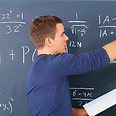
Report: Israel lacks qualified math teachers
State Comptroller report reveals low number of trained teachers, leading to lasting harm to students, deeper economic gaps
Future damage to students, private lessons perpetuating economic gaps and career change in the business world, are some of the effects noted in the State Comptroller report which showed Israel has a low percentage of mathematics teachers fully trained for the role.
Along with concern over the current state of the education system, professionals who spoke with Ynet stressed that the future side-effects would be much more severe.
Related Stories:
- State Comptroller: Rate of converts to Judaism drops by 50%
- Yeshiva heads, teachers slam Lapid's education reform
- Minister Piron to haredi schools: No math, no funding
"The state of math education critically harms the economic and security strength of Israel, given it is the basis for all other sciences," warns Professor Zvi Arad, president of the Netanya Academic College, as he calls for a comprehensive alternative plan based on intense training for teachers.
Professor Zemira Mevarech, Dean of Social Sciences Faculty at the Bar Ilan University and former Head Scientist at the Education Ministry, pointed to damage caused to the students and emphasized that they could be deterred from the profession due to improper teaching.
"Even if teachers teach very well, if they do not have proper training in mathematics – the consequences will be in accordance," she clarifies.

'Hard to keep the students focused and interested' (Photo: Roee Idan)
According to the comptroller's report, about 40% of educators teaching civics, geography, history, Hebrew literature and languages in post-primary schools in the past year were not trained to teach those subjects.
In 2010, only one third of post-primary math teachers in state-Jewish education and half of the teachers in state-Arab education had a relevant academic degree, as required.
According to Dr. Tali Nachlieli, Head of the Department of Mathematics at the Levinsky College of Education, the situation in the classrooms highlights the root of the problem.
"It is an unattractive profession. Why should someone who excels in math become a math teacher? They could make a lot more money in any other field."
According to her, "the general view is that whoever knows math and gives private lessons could teach the subject in school, and that is simply incorrect." The private lessons, she added, may assist the students, but increase the gap at the same time.
"The students need someone to encourage them. When the subject is taught by someone who is not trained for it, they would not know how to locate the common issues and not know how to challenge the stronger students. The students miss out on the learning experience, sit in the classroom, copy meaningless exercises from the board and finish the lesson feeling frustrated," described Nachlieli.
Professor Tamar Ariav, President of the Beit Berl College, said the shortage of math teachers is felt in elementary schools, and is increased in middle and high schools.
However, she claimed, "we can't look at the findings so simplistically. The shortage brought the system to take aid in academics with a bachelor's degree in fields such as computer science, statistics and engineering, which all consist of about 80% mathematics, and with additional training they could definitely be suitable to be high school teachers."
- Receive Ynetnews updates directly to your desktop










